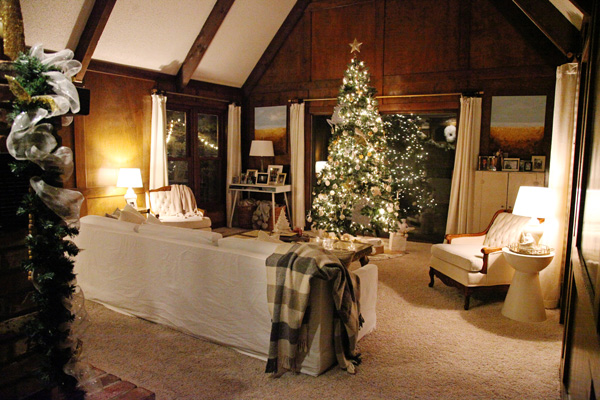With Spring quickly approaching and us *hopefully* wrapping up our basement/guest room in the coming months I’ve been reflecting quite a bit on our experience over the past year and all of the work that we’ve had done. This is a post that is no fun to write and if you’re reading it then you may not be feeling too awesome yourself either. Water in your basement is basically a nightmare. In the two homes we’ve owned we’ve had water in both of our basements. #midwestliving Each time it’s a panic and scramble to do your best to get the water out. Last year we had huge water issues and spent many hours battling our leaky basement (and subsequent foundation problems). In our moments of desperation we definitely found ourselves turning to the internet searching ‘what to do when you get water in your basement’. If you’re doing the same thing here are my top tips for what to do when you get water in your basement.
What to do when you get water in your basement:
- Don’t panic. Take a breath and know that it’s not going to last forever and your home, most likely, isn’t ruined. Water can be extremely damaging, but unless you are truly flooded your home will likely be fine and completely salvageable. We’ve had nearly every level of leaky basement. We’ve had trickles, streams, and gushing over the top of your foot water. All levels are worrisome and most of them are correctable.

- Get the water out as best as you can. Yep, Captain Obvious here. We have used shop vacs, shovels (absolutely NOT fun), brooms, towels and buckets. If you have a shop vac that’s going to be your best bet. No method of water removal is pleasant but all have served a purpose. Do what you have to do to get the water out.
- Channel the Water. Once the bulk of the water is out and you have located the source, you have a few minutes to collect yourself and think. If you have streaming water coming in and you can see it do your best to channel the water into some sort of collection container. Last year we had a horizontal crack (talk about horrifying) and once the water flow calmed we were able to use gorilla tape to tape plastic sheeting to the foundation under the crack, and sealed the tape with a bead of caulk. That allowed us to direct the water into buckets so we weren’t chasing it all over the floor. It also eased our mind that water wasn’t being absorbed into carpets, studs, and drywall. This was obviously a temporary fix to help us get through the initial phase of the water leaks.

- Get Rid of Excess Moisture. Once you’ve managed to get rid of all of the standing water you need to get rid of the excess moisture. Use towels and rags to help soak up any damp spots and then pull out a dehumidifier. The dehumidifier will help fully dry out the space. If your carpets have gotten wet consider pulling back the carpet and pad so moisture isn’t trapped under the pad.


- Check your gutters and the flow of water around your house. My husband is a nut about making sure our gutters are cleaned and not overflowing. This is because in our first home leaking gutters were the cause of our leaking basement. Once we had the gutters replaced the water stopped coming into the house. Make sure your drain pipes and downspouts are working properly. If you have water pooling around a specific area of your home when it rains then that may be a sign you need to build up the dirt in that area or create a way for the water to move (via a drain, channeling the dirt, adding a downspout, using wider downspouts, etc).
- Consider pond liner. If the problems doesn’t seem to be related to gutter or downspout issues, and if building up your dirt level to drain away from your foundation doesn’t solve the issues, consider laying a pond liner and putting river rock on top. We had a couple of spots in our basement that would become damp in heavy rains no matter what we seemed to do. After installing some pond liner that prevents water from seeping into the soil until it is several feet away from the foundation, we have not seen any dampness. It is easily covered by river rock and the only downside is that it prevents any in-ground landscaping in those areas. (Potted plants, or other above-ground landscape options can be used.)

- Know your limits. There have been times when things were intermittent enough that we could handle issues as they arose. But there came a point in both of our homes when we knew the problem wasn’t going away and we were in over our heads. The breaking point is going to be different for you than it was for us. You may want to call at the first sign of water….you may want to call after you’ve been flooded. I’m not going to tell you the exact moment you need to call a professional. You need to be honest with yourself, your skill level and the amount of time you are willing to work on the issue and deal with incoming and water. When we called professionals to fix the problem we were ready to spend the money and hand the problem off to someone else. For us, it is money well spent. (Especially because many companies offer a warranty on their work. Personally I would not go with a company that does not offer a warranty.)


- Educate yourself and don’t go with the first person to give you a quote. You need to ask around for referrals and get more than one company to come out and give you a quote. In our area prices were widely varied and companies have proven to be unreliable in following through at all levels of the process.


I do not want anyone who stumbles on this post to read this next part and immediately freak out. Sometimes, NOT ALWAYS, a wet basement can be a sign of foundation issues. A wet basement does NOT automatically mean that you need to have foundation work done. We have had foundation work done in both of our homes so I feel that I would be remiss in not at least mentioning it here. If you think you have foundation problems and that your wet basement is because of the foundation the first thing you need to do before calling any other professional is to call a structural engineer. DO NOT start by calling foundation companies. In our first home the first company to come out quoted me, no exaggeration, $20,000 in work. Of course I freaked out. In the end the total for foundation and other work was around $2500. Thank heavens we didn’t use that company! A structural engineer will look at your homes foundation and tell you if there is movement in your foundation and if it has moved to the point of needing work done. All homes move, NOT all homes need foundation work. A structural engineer will cost a few hundred dollars but they will tell you what work needs to be done, and can generally give you a range of what you could expect to spend in your area. Additionally the structural engineer works for YOU. They aren’t working for a foundation company and they aren’t trying to sell you anything. Here in Kansas City we used Norton & Schmidt and had a great experience, we can’t recommend them enough.
We are certainly not experts, but unfortunately have had many trial by fire situations. Luckily we’ve lived to tell the tail through them all so far. A leaky basement isn’t the end of the world. It’s stressful, it’s not fun, and sometimes it’s expensive. But it doesn’t mean that your house is worthless, is going to cave in, or that you will be spending $$$$$$$ in the short term. Remember that you are not the only person who has ever had to deal with water in your basement. Stay calm and take it one step at a time while you navigate through.
Don’t forget to pin!


(This post contains affiliate links. If you shop from one of these links it helps support this blog. Products do not cost more when you shop through an affiliate link. To read all of this blogs disclosures and policies click here.)









Leave a Reply